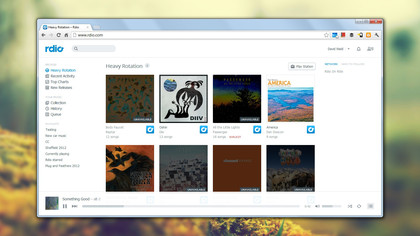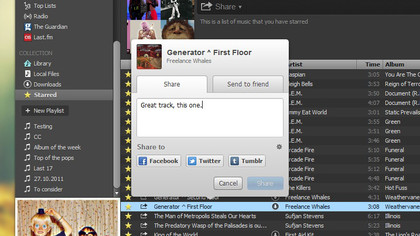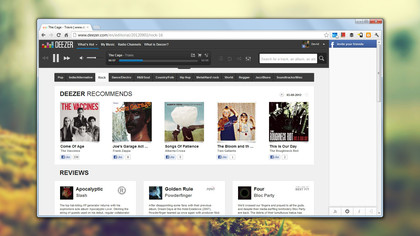Spotify vs Rdio vs Deezer: battle of the streaming services
Which platform is most worthy of your monthly subscription?

Spotify vs Deezer vs Rdio: Playlists and sharing
Smart playlists have yet to appear in streaming subscription land, but Spotify, Rdio and Deezer make it very straightforward to create and build playlists manually. Rdio and Deezer make it easier than Spotify to manage your 'collection' - think iTunes Library vs the whole iTunes Store - but Spotify was our favourite for managing a queue.
If you prefer to add on songs, albums and playlists to the end of what you're currently listening to, in one long uninterrupted stream of music, Spotify does this a little better than the others.
If you want to work on collaborative playlists, this is possible in each service. Spotify and Deezer give you more control over shared playlists, enabling you to choose specific users who can make changes. In Rdio, playlists are either private, public (can be edited by anyone), or accessible to everyone you are following.
In terms of simple, non-collaborative sharing, this is again available on all three of these platforms, whether you want to use Facebook, Twitter or the service's built-in user-to-user sharing capabilities. Deezer and Spotify really push their friction-less Facebook sharing capabilities, though it is just about possible to keep your listening habits private if you tweak the relevant settings.

Rdio vs Spotify vs Deezer: Offline syncing/local files
Offline syncing is pretty essential for mobile use, and Spotify, Rdio and Deezer all have this functionality built into their mobile apps.
It can also come in handy on the desktop, should your Internet go down or you want to use your bandwidth for another task -- Spotify's desktop client can cache files for offline use, and so can Deezer's web client, if you install the official browser extension. Rdio doesn't currently offer offline syncing on the web or in its desktop application.
Both Spotify and Deezer let you import your own tracks into your collection, though the process is much easier with Spotify, which can monitor particular folders or libraries on your hard drive. Deezer uses a clumsy browser-based upload system -- it's not ideal, but it works.
Get daily insight, inspiration and deals in your inbox
Sign up for breaking news, reviews, opinion, top tech deals, and more.
However, there's no ability to do this in Rdio, perhaps the biggest black mark against it. Its desktop app can scan and match what's in your iTunes or Windows Media Player library, but anything that isn't matched isn't available.

Spotify vs Deezer vs Rdio: Verdict
It's a close run race between Rdio and Spotify at this moment in time, though both services are introducing new features on a regular basis. In many ways we found Rdio to be the best-looking, easiest-to-use, most intuitive platform. It has a Collection feature to beat Spotify's, but there's one huge problem -- no local file support.
That means the gaps in Rdio's catalogue (like Arcade Fire) can't be filled, so you'll still have to start up iTunes if you want to listen to something Rdio doesn't have. There's also no offline caching on the desktop, and for these reasons our £10 a month is staying with Spotify.
Its desktop and mobile apps have improved in recent months, and it has matured into a stable and comprehensive service. If the rumours of a browser-based app are true, we'll love it even more.
Deezer is a decent bronze medal winner -- in many ways it offers the best of Spotify and Rdio, but it was too fiddly and too unintuitive in too many areas. It has potential, but it's not up to the level of the other two yet.

Dave is a freelance tech journalist who has been writing about gadgets, apps and the web for more than two decades. Based out of Stockport, England, on TechRadar you'll find him covering news, features and reviews, particularly for phones, tablets and wearables. Working to ensure our breaking news coverage is the best in the business over weekends, David also has bylines at Gizmodo, T3, PopSci and a few other places besides, as well as being many years editing the likes of PC Explorer and The Hardware Handbook.